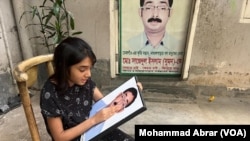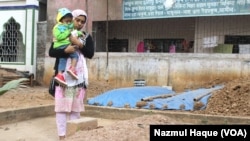Bangladesh's Foreign Minister AK Abdul Momen told visiting UN High Commissioner for Human Rights Michelle Bachelet that there were no cases of enforced disappearances or extrajudicial killings in Bangladesh.
Bachelet arrived in Bangladesh on Sunday, where he made a five-day visit to discuss various human rights issues with the government, civil society and others.
In a tweet, the United Nations said Bachelet would release his statement on Wednesday at the end of his visit.
After senior ministers met with Bachelet on Sunday, Momen said at his briefing, Bachelet said no one had been the victim of enforced disappearances or enforced killings under Prime Minister Sheikh Hasina's government. Said he was told. Country.
Human rights activists and families of victims said the government's claims that there were no extrajudicial killings or enforced disappearances were not true.
"There are hundreds of such cases in Bangladesh and there is legally acceptable evidence," said Mohammad, liaison officer at the Hong Kong-based Asian Legal Resource Center. Zaman told his VOA. "What ministers have told the UN Human Rights Commission about this serious human rights violation is a complete lie."
"No extrajudicial killings, enforced disappearances."
Over the past decade, several reports from global human rights groups have shown that the police, the military, the elite militia Rapid Action Bangladesh battalion, and other security agencies have committed extrajudicial killings. and was involved in enforced disappearances.
According to the Hong Kong-based Asian Human Rights Commission, at least 2,658 people were extrajudicially killed and at least 619 were victims of enforced disappearances between 2009 and June 2022. became.

"We have told [Bachelet] that there are no cases of enforced disappearances in our country," he Momen told local media on Monday. “In Bangladesh, some say 76 people have gone missing by the government in the last 10 years. In fact, we have traced 10 of them. Others could not be traced.”
Mr Momen added that ministers had told Mr Bachelet that there had been no extrajudicial killings in Bangladesh in the past 13 years.
“There were extrajudicial killings in Bangladesh from 2002 to 2005 [when Hasina's chief rival Khaleda Zia was Bangladesh's prime minister]. We told her there weren't any reports of such killings," Momen said.
Hasina served his third term as Bangladesh's prime minister after winning the 2008 national elections.
Opposition activists, dissidents
Families of victims of enforced disappearances and extrajudicial killings, opposition political parties, and rights activists sought to cover up the truth.
"Enforced disappearances, extrajudicial killings, torture in custody, and other human rights abuses have persisted in the country for years." It is being done," said Afroza Islamic Ankhi, co-founder of Mayer Daak, which represents the families of the victims. He told VOA about the forced appearance. “Some of those kidnapped or arrested by the security services have been found riddled with bullets. Some remain missing.”
Anki's brother, Bangladesh Nationalist Party (BNP) leader Sajedur Islam Shuman, the country's largest opposition party, disappeared after he was allegedly kidnapped by the RAB in 2013.
In the presence of many witnesses, they kidnapped my brother and five others from Dhaka. "RAB-1" was embossed on the vans used during the operation. Some of the men wore his RAB's regular uniform and carried firearms. He has remained missing ever since. The media then reported the incident citing eyewitnesses," she said. ``Ministers deny the truth and make nonsensical comments.''
BNP leader AKM Wahiduzzaman said that most victims of extrajudicial killings and enforced disappearances in Bangladesh are from Hasina. said they are political activists and dissidents who oppose the government's views of the initiative.
“Rights groups collated figures show that extrajudicial killings tripled in the last two national election years (2014 and 2018) under the Hasina-led government. , which proves that the government is using law enforcement to eliminate all Bangladeshi opposition," said Wahiduzzaman.
"In order to cling to power, Sheikh Hasina pursues policies too dangerous for democracy."
Secret Detention Center
Ashrafzaman told VOA that ministers of the Hasina-led government have lied about the issue in past UN conferences.
``They followed the same course this time around, providing false information to Bachelet. I can't raise my voice for fear of coming," said Ashrafzaman. “From a few people who have tried to reach out to human rights groups, I have learned stories about how security services kidnap people and torture them in secret detention centres.”
Angelita Bayens, vice president of international advocacy and litigation at Robert F. Kennedy Human Rights, said hundreds of cases of enforced disappearances and extrajudicial killings in Bangladesh are well documented and documented locally and internationally. criticized by civil society. Expert.
"The government's outright denial of the issue further confirms the openness and engagement of the Bangladeshi authorities on this issue," said Bayens. It is a matter of great concern and should not go unnoticed by the international community.



